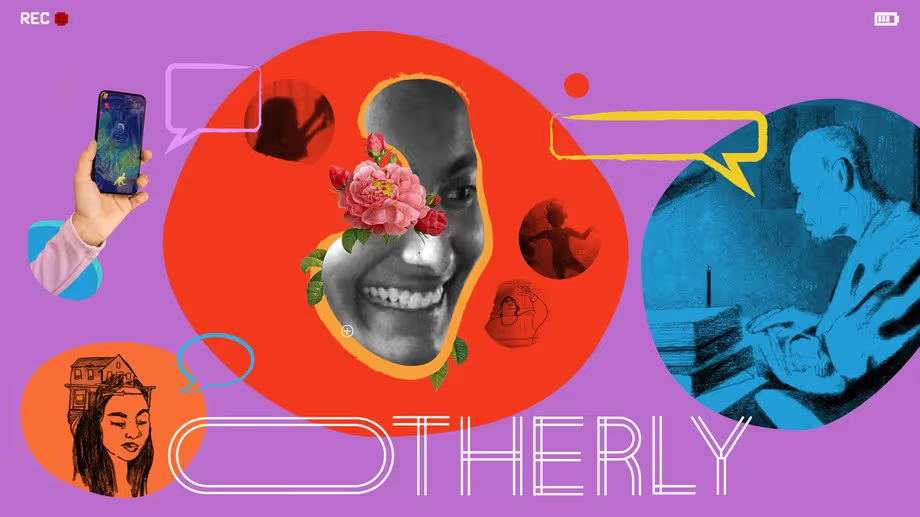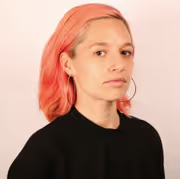Otherly Documentary Trio Lesson Plan: Posting Our Stories
Overview

It’s as if we’re right there with them: In their phones, their rooms, their conversations. It’s as if they’re our friends posting to their accounts, although this time our friends are posting exquisite narratives telling us truths about identity, family, belonging, healing. These three films: “Integrate.Me,” “Elaine is Almost,” and “FaceTime” all use the technology readily available to us in our devices to craft narratives that span both temporal and emotional journeys. The films are three of the seven that were selected from hundreds of submissions sent in to the an open call to women, non-binary and genderqueer storytellers of all artistic backgrounds by POV Spark and the National Film Board of Canada. They were charged with telling important stories that often go untold in mass media, while using Instagram in innovative ways.
This is a fitting time for their work and for this project. The news media is focused on the theme of cultural and political division in the U.S., and the realm of social media is often viewed as the hive of that division. These films (and this lesson) live outside of that dominant framing and live into the truths of their authors’ lives. Instead, the films remind us that social media can also be a platform for vulnerability, for self-revelation, for providing a counter narrative to those that would tell a very different story about what our bodies mean in the world.
This lesson invites and challenges students to place their own stories in relation to the shared stories of a larger community in a particular moment. In other words, they will explore the interrelation between their individual stories and “history;” and the nuances between the particular and universal. Following this comparative exploration they will use their analyses to craft a specific story with a given arc and from that outline create their own innovative Instagram post or series. Their work will conclude with a celebratory screening.
A Note on Technology and Accessibility:
This lesson, as well as the others in the Otherly series, bring social media into the classroom. These lessons are designed to integrate ethical engagement on social platforms to complete the assignments. It will be important for you to check with your school or district for any regulations around classroom or in-school student social media use. In addition, this lesson entails the creation of a class Instagram account. In order to set this up, the teacher will need to set up an IG account which will be shared only to the class, with a username and password that students can all access. That said, while some of the content and theory of the lessons would be lost without the use of social media, students could complete the assignments using the photo and video tools on their phones. However! The lessons are intended to critique, engage, and potentially transform the use of social media. If possible, the lesson will be most transformative as a social media-based engagement. And with enough planning, you and your learning community can create an analogue version of this lesson with printed-out photographs, storyboards on large paper in the classroom, and using school-based technology to record and play videos in school.
A Note from Curriculum Creator, Jade Sanchez-Ventura
I believe in personal narrative. I think that to communicate the particular experience of a life and to tie it literally or intuitively to the histories--familial, cultural, societal--that have shaped us is an act of resistance that also makes for excellent storytelling. This conviction is the underpinning of my work as an educator: No matter the subject, I know that every young person has a singular, vital perspective to bring and my role is to act as a catalyst for their bursts of insight and inspiration. Sometimes (too often) my role is to help students recognize the power of their own insight and intelligence. As with all systems of our society, the classroom can also be a site of profound oppression and silencing. As one mentor told me, “You want your students to leave a classroom not thinking that you’re smart, but that they are.” Often that entails reminding myself that with every generation there are new methods of making and communication emerging; reminding myself to ask students about what is present and relevant to their daily lives.
Smartphones and apps and social media often feel like the epitome of a generational divide. Phones are banned from classrooms (including my own, generally), social media is demonized (even though we all use it), or if not demonized, trivialized--regarded as a cultural arena for entertainment and play, but not for serious study and critique. However, many of us, and certainly most young people, are daily crafting intimate narratives about their own lives on those very phones. Any minute on Instagram is one crammed with countless Stories, Posts, Live broadcasts from our lives. Yes, the celebrities and politicians and gatekeepers are there too, but one can easily ignore them and follow only the interpretations and explorations of regular folks like us.
Much has been made of the information bubbles made possible by social media. Certainly that is an important conversation to have, but for the purpose of this lesson (and it’s partner lessons featuring the Otherly documentary series), we have the chance to interrogate the vast options for self-expression and self-chronicling afforded by social media, in particular Instagram. I am enchanted by the truism that the more focused and personal a story, the more broadly it appeals. There is a magic that happens when an artist tells one small story honestly-It becomes a big truth that resonates for countless others.
The Otherly Documentary Series conveys three of those stories. “Integrate.Me,” “Elaine is Almost,” and “FaceTime” are crafted from the images of our everyday lives. They use the medium of Instagram and visuals of social media and our phones to create the illusion of an almost casual moment--as if the filmmakers are simply sitting down with us to confide. Taken together they create a vivid example of what a powerful and radical act it is to create one’s spaces of home, of belonging; a creation made even more radical by the choice to share these films on Instagram, to create as many conversations, and stories, as possible.
A Note to Teachers
This is intimate work that will ask students to take a leap of trust in each other and in you. Depending on where you are in your year and with your group, this may be a first flight or one that builds on the bond in an already tight knit class. And of course, you may be applying this to a group of students who have only ever met each other on a digital platform like Zoom. Wherever you are, I encourage you to have faith in yourself and your students to make this leap! However, there are preparations that will be necessary to keep this space safe, and therefore positive, for all. Before beginning, I strongly suggest you create community agreements with your group. Even if you already have these in place, this is a good moment to review. You can also adapt your class agreements to a set specific to this project. Here is a sample list of community agreements, and there are a wealth of resources online for how to create a set of agreements with your class. Because all the variations of this lesson include sharing work in public and allowing for public comments, it will be essential to create a set of agreements focused on how to do so in a respectful, inclusive manner. For those using social media, that emphasis will be especially important. Take time to outline “Content Sharing” agreements. Though the time spent on these agreements might seem an aside to the curriculum itself, in fact those conversations will help create a shared trust that will facilitate powerful creative and academic learning.
Subject Areas:
- Journalism
- Filmmaking/Visual Art
- English
- History
- Current Events
- Social Justice
- Sociology
- Psychology
- Health
Grade Levels: 8-12 (can be scaffolded for Higher Education)
Objectives:
In this lesson, students will:
- Learn the practice of archiving, creating logs, catologing, and identifying patterns in narratives.
- Understand how to use social media and cell phones as archival tools; build a more critical understanding of the role algorithms play in shaping stories.
- Use research skills to find connections between global/historical/cultural milestones and personal narratives.
- Learn the basics of story structures and creating a story arc.
- Create an IG story that uses personal archival footage to tell a story arc, a living history.
- Engage in a collective community practice of learning about ethics, social media, and story sharing
Materials:
- Films and equipment to project/screen the films.
- Physical or digital space for charting student discussions. (Whiteboards, chalkboards, poster paper, digital whiteboard, etc.)
- Note taking materials: Pen, pencils, paper, or relevant assistive technology for students who use electronic devices for note taking.
- Personal recording devices, one per student: Smartphones, laptops, tablets would all work.
- A private Instagram account created by the teacher for each class section; teacher and students share account admin capabilities through a shared username and password.
- Handout: Modified Freytag’s Pyramid
Time Needed:
2-3 sixty minute sessions


